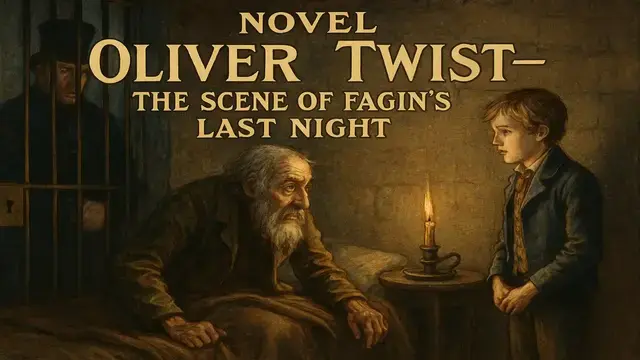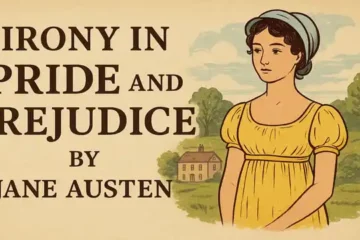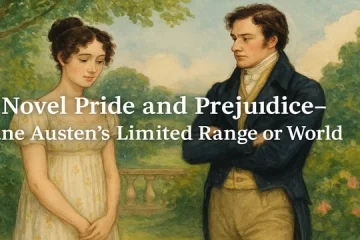The Sight of Court:
The court room is overcrowded. All the eyes are fixed on Fagin. He is standing with one hand resting on the wooden slab before him, the other hand holds his ear and his head is thrusting forward so that he may hear every word of the presiding judge who is delivering his charge to jury. He is overcome with anxiety. He has scarcely moved since the beginning of the trial.
The judge ceases to speak but Fagin still remains in the same attitude of close attention as if he was still trying to listen. People are whispering. Contempt is visible on their faces. Not even women seem to have any sympathy for Fagin. The Jury comes back and gives its verdict – guilty. There is a tremendous shout from the people when it is proclaimed that Fagin will die on Monday, and this shout is echoed by the crowd outside. When Fagin is asked if he has anything to say, he can only mutter that he is an old man. While the sentence of death is pronounced, he stood dumb and motionless. Later he mechanically goes with the jailors.
Fagin’s Pondering over his Past Deeds in the Cell:
A search is made on Fagin. Then he is left in the cell. Sitting on a stone bench he tries to collect his thoughts. He gradually comes to realize the significance of the words of the sentence pronounced upon him. The reality of the words “hanged by the neck until dead” rises like a specter before him. He remembers that he has seen a number of people dying like this by his own acts. People who have fallen a prey to his villainy must have ultimately spent their last days in cells like the one in which he is to be confined until the last day of his execution. He is frightened at these thoughts and beats his hands against the door and walls and sought for light. A candle is brought and the man, who is to keep a watch on him, comes into the cell. The church bells keep ringing throughout the night. Some religious people come to him to join him in prayers but he sends them away. On the night after Saturday, he realizes that has one more night left to live after this. Most of the time, he just sits, awakes, but dreams. People keep turning in keeping a watch over him but he is unaware of their presence.
Preparations for Fagin’s Execution and Brownlow’s with Oliver Meeting Fagin:
Fagin realizes that there is no escape possible. He is unnerved that he is given company by two persons, but no person is willing to keep a watch over him. People are happy at the judgment. Preparations begin for his execution. Mr. Brownlow along with Oliver came into his cell to meet the condemned prisoner.
Brownlow’s Asking Fagin about Papers and Fagin’s Catching Hold of Oliver for his Escape:
Fagin is brooding in his cell. He recalls to his imagination his companions. The watchman has to make an effort to recall him to his surroundings. As Fagin recognizes his visitors, he shrinks from them. Mr. Brownlow asks him about some papers which Monks has left with him. At first Fagin denies having any knowledge of them, but when Mr. Brownlow solemnly requests him to tell where those papers are, he tells Oliver that they are in canvas bag, in a hole a little way up the chimney in the top front room. Then for a little while he imagines that Oliver can help him to escape from the prison and he firmly catches hold of him. It is with the help of the man on duty that Oliver is disengaged from Fagin. Oliver departs with Mr. Brownlow. Fagin struggles with his attendant, sending up cry upon cry that penetrates even those massive walls. A large crowd can be seen to witness the execution of Fagin.
Thus, Dickens has drawn this chapter most imaginatively. In fact, the novelist seems to have identified himself with Fagin. It appears that Dickens lives in this chapter as Fagin. He takes us into the soul of the old monster. The last moments of the life of the evil monster have been most imaginatively and humanly drawn. The chapter is thus an artistic triumph of Dickens.




